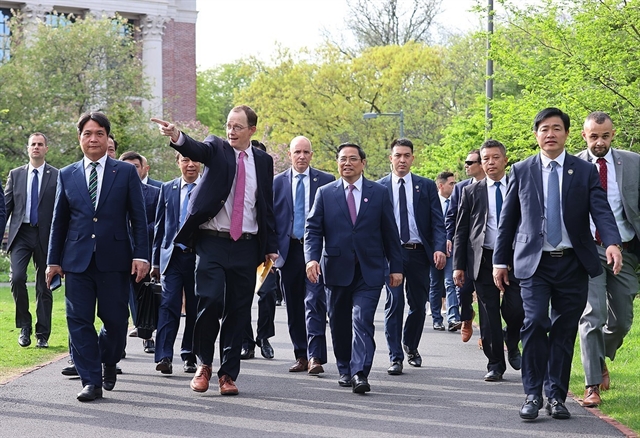 Politics & Law
Politics & Law


|
| Prime Minister Phạm Minh Chính visits Harvard Kennedy School in Cambridge, Massachusetts. — VNA/VNS Photo |
WASHINGTON — Prime Minister Phạm Minh Chính attended a policy dialogue about development orientations of Việt Nam in the 21st century with professors of the Harvard Kennedy School in Cambridge, Massachusetts, on May 14 (US time) as part of his working trip to the US.
Speaking at the dialogue, Minister of Planning and Investment Nguyễn Chí Dũng said in 2019, he led a delegation of researchers to Harvard School to listen to experts’ opinions about the development strategy for the country. The delegation then studied and presented information on sustainable development. Accordingly, in order to achieve sustainable development, Việt Nam needs to achieve sustainability not only in the economy but also in culture, society and among human beings.
Việt Nam defined the target of placing the people as the subject with all policies revolving around the people and benefiting the people, Dũng said.
“Việt Nam sees that rapid and sustainable development must be based on new motivations. Apart from mechanisms and infrastructure, it is necessary to supplement two new motivations in the three breakthroughs that are science and technology and innovation, and cultural value of Vietnamese people,” he said.
Professor David Dapice appreciated Việt Nam's participation in international trade agreements, hailing it as a wonderful success. Millions of agricultural workers have moved to work at factories. However, as the majority of the production materials of Việt Nam were imported, the country’s import products were affected by the outbreak of the COVID-19 pandemic with borders closing or in case of trade tensions. Therefore, the professor said Việt Nam needed to develop domestic inputs and diversify sources for export.
Professor Dapice evaluated that the trade surplus of Việt Nam with the US could reach US$100 billion this year. He said Việt Nam needed to promote foreign direct investment (FDI) attraction, trade exchanges with other countries and education and training cooperation, in order to create competitive advantages in ASEAN.
In addition, the economy’s opening must be maintained, attracting more talents and creating favourable conditions for investors, he said.
Many localities of Việt Nam are in remote areas without favourable infrastructure, making it hard for them to get access to and attract FDI so the professor suggested the country test the application of property tax, allowing localities to use property tax for investment without the use of State budget.
Speaking at the discussion, Governor of the State Bank of Việt Nam Nguyễn Thị Hồng admitted that international integration would bring many opportunities for Việt Nam but the country would also have to face many challenges. The bank must increase forecasts to put forward synchronous policies in line with the reality, and resolutely not use monetary policy to create competitive advantages in trade.
With that consistency, Việt Nam had recorded impressive results in curbing inflation alongside a relatively high growth rate. The foreign exchange market was stabilised which was a bright spot to help improve Việt Nam’s credit rating, she said.
Medical professor David Golan spoke highly of Việt Nam’s COVID-19 prevention and control measures. Since the first days of the pandemic, Việt Nam decided to apply social distancing, limit travel and enhance the response of medical establishments. Doctors and nurses are the most vulnerable so Việt Nam focused on equipping and protecting them to limit infections. The Ministry of Health mobilised medical students to join the fight against the pandemic.
The Harvard Medical School donated $700,000 to help train 5,800 students who then were mobilised to pandemic-hit localities of Việt Nam to help strengthen their medical systems. He proposed Việt Nam set up a biomedical research centre to help transfer technology and build strategic biomedicine.
At the dialogue, PM Chính answered questions of experts and students from Harvard School. He affirmed Việt Nam’s consistent policy of innovation which must be inherited, renewed and developed.
The Government leader stressed the need to have an innovation ecosystem, initially having mechanisms, resources and human resources in order to encourage everyone to join innovation. He also said it was necessary to have international cooperation to create an innovation ecosystem.
Regarding the development of the digital economy, PM Chính said cyber security was a global issue and Việt Nam was boosting international cooperation and improving its own capacity to deal with emerging issues. He stressed that international experts could help to complete mechanisms and technology relating to cyber security, particularly in human resources training.
At the event, a representative from the Harvard Kennedy School announced that the school was cooperating with Sovico Group to build and sponsor an initiative on Việt Nam’s climate policy. The project would focus on research and training to strengthen the recovery capacity of cities in Việt Nam in response to climate change and to develop renewable energies. —VNS




